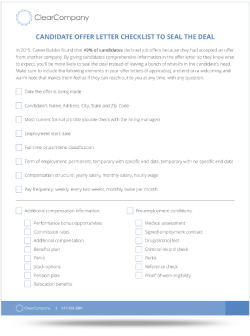We’ve heard all the stereotypes. Millennials don’t stick around in their positions for more than three years, Millennials are slackers and they hold a sense of entitlement. Despite all these common negative stereotypes, there are many common positive competencies and characteristics college grads are known for. One main theme is that Millennials are confident in what they stand for and how they want to use their skills to improve purpose-driven organizations.
If you want to tap into the skills of new graduates, you will need to start thinking like the talent that’s walking across the stage this spring.
Stand up to the Skills Gap
Many HR professionals have been discussing the painful skills gap, but is it really as big of an issue as we’re making it? Not quite. Focus on soft skills in hiring and use your onboarding programs to develop new hires’ tactical techniques and hard skills. This gives new team members a catered and branded experience, introducing them to yourcompany’s values, processes and expectations all while allowing you to provide necessary training.
 How to stand up to the skills gap by focusing on soft skills in the hiring and onboarding programs:
How to stand up to the skills gap by focusing on soft skills in the hiring and onboarding programs:
Don’t be afraid to get your existing team involved either. Training and onboarding new hires is still the first impression that can have lasting effects on your workforce. In fact, mentoring increases productivity by 88%. Match new hires with your top performing employees to act as their mentor for the first few months upon hiring. Mentors will familiarize new hires with specific responsibilities, expectations and expose them to the company culture.
Learn more about company culture best practices
Create Flexibility
Flexibility and work-life balance are increasingly being discussed in the HR/hiring space for good reason. 30% of employees report work-life balance as a leading contribution for their loyalty. Employees today want to be recognized for the actual work they accomplished, not the number of hours on their time card.
 30% of employees report work-life balance as a leading contribution for their loyalty. Read more:
30% of employees report work-life balance as a leading contribution for their loyalty. Read more:
Work-life balance can mean many things, but to 59% of Millennials, it means “flexible hours.” During the hiring and interviewing stages, ask what time schedule the candidate would prefer instead of assuming they’re ready to jump into a 9-5, five days a week arrangement.
Also, discuss your work-from-home and vacation policies. For example, at ClearCompany, we allow for employees who are meeting their goals to have flexibility – working from home, time to accommodate hobbies and more. We also have an informal office exchange program which allows a team member to swap offices with another employee or just go work out of another office location. We find perks like this go a long way in motivating younger top performers.
Offer Career Planning
53% of Millennial employees are looking for career pathing opportunities in their jobs. In larger organizations, mentors can assist executives with one-on-one career planning meetings. Then, leadership can work with a team of mentors to gain a sense of what their mentees are excelling in and what kind of development options should be provided. Career planning conversations are key to engaging and retaining your workforce, new or tenured.
How to create job descriptions that capture top talent: 
Inspire Purpose
76% of Millennials consider a company’s social and environmental commitments when evaluating places to work. There are many ways to integrate Corporate Social Responsibility programs into your organization which will create an inspirational and giving workplace. Build culture and engagement by forming teams, tracking donations and volunteer hours and providing the winning team with gift cards or other small, yet desirable awards.
Today’s graduating talent is interested in organizations who invest in their community and employees. In order to show that commitment, your company should create an onboarding program that shows interest in their success from day one and offer the real-time feedback and guidance they need to build an environment of inclusion and purpose.
How are you attracting and inspiring top talent this Spring? Share with us! @ClearCompany


.png)


